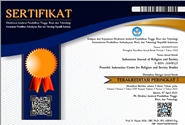Pengembangan Perusahaan Berbasis Nilai Islam pada Digital Startup
Abstract
Lots of studies argue that company development is determined by innovation, adaptability, and institutional dynamism. This study aims to explain the development of islamic value-based companies in digital startups, whereas the success factor of company is not only determined by innovation, adaptability, and institutional dynamism, but precisely caused by role of islamic values which was developed by the companies. Through qualitative approach, this results of study show that the islamic values which are the foundation of the company in carrying out to all operations of institution are Tauhid, Qonaah, competent, and moral. These islamic values at PT. Badr Interactive is built through the regulatory, normative, and cognitive cultural pillars. In general, islamic values play a role in four human resources, marketing, social responsibility, and corporate culture aspects. The influence of islamic values in these aspects produces an output of good quality product applications, good teamwork, strong employee resilience, employee spiritual needs, planned marketing strategies. These indicators are digital startup companies sources of success.
Keywords
Full Text:
PDFReferences
Abdullah, N. A., Omar, F., Ab. Rahman, N. M. N, & Adham, K. A. (2013). Conceptualizing work and organizational values from the Islamic perspective. Jurnal Pengurusan, 39(2013), 119–128.
Ahlemann, F. (2016). How digital transformation shapes corporate IT: Ten theses about the IT organization of the future. Proceedings of the 2016 Federated Conference on Computer Science and Information Systems, 8, 3–4. https://doi.org/10.15439/2016f597
Ahmad, N., Shafique, M. N., & Ahmad, H. (2016). Islamic Principles and Values in Modern Organizations. Nigerian Chapter of Arabian Journal of Business and Management Review, 3(10), 1–8. https://doi.org/10.12816/0017681
Alfalih, A. (2016). Religion, culture and management: a comparative study of the impact of Islam and Saudi culture on HRM practices of indigenous and foreign owned and managed corporations in Saudi Arabia. Retrieved from http://hdl.handle.net/2436/618494
Asosiasi Penyelenggara Jasa Internet Indonesia [APJII]. (2014). Profil Pengguna Internet Indonesia. Jakarta: Asosiasi Penyelenggara Jasa Internet Indonesia.
Bahaudin, T, 2007. Brainware Leadership Mastery – Kepemimpinan Abad Otak dan Milenium Pikiran. Jakarta: PT. Elex Media Komputindo
Bilal, K., Ayesha, F., & Zareen, H. (2010). Human Resource Management: An Islamic Perspective. Asia-Pacific Journal of Business Administration, 2(1), 17–34. https://doi.org/http://dx.doi.org/10.1108/MRR-09-2015-0216
Branine, M., & Pollard, D. (2010). Human resource management with islamic management principles. Personnel Review, 39(6), 712–727. https://doi.org/10.1108/00483481011075576
Chatman, J. A. (1991). Matching People and Organizations: Selection and Socialization in Public Accounting Firms. Administrative Science Quarterly, 36,459-484
Creswell. (2002). Qualitative, quantitative, and mixt method approach (second edi). london.
Dimaggio, P. J. and W.W. Powell. (1991). The New Institutionalism In Organizational Analysis. Chicago: University of Chicago Press.
Durrani, B. (2016). Islamic Concept and Contemporary Corporate Social Responsibility : Comparative Study between Islamic Banks and Conventional Banks in Pakistan. Journal of Management Sciences, 10(2), 317–332. Retrieved from http://www.qurtuba.edu.pk/jms/default_files/JMS/10_2/JMS_July_December2016_317-332.pdf.
Habiburrahman, H. (2019). Islam dan Kapitalisme; Titik Temu dan Kritik Dalam Al-Qur’an. Indonesian Journal of Religion and Society, 2019, 01(01), 38-50. https://doi.org/10.36256/ijrs.v1i1.23
Hackman, J. R., & Oldham, G. R. (1975). Work redesign. Canada : AddisonWesley Publishing Company, Inc
Liu, A. (2010). Measuring Spiritual Capital as a Latent Variable. The Research Methods Institute
McLennan, G. (2001). Sociological Cultural Studies: the Question of Explanation. Cultural Studies, 16(5), 631–649. https://doi.org/10.1080/0950238022000025200
Mudo, S. (2015, Agustus 26). Apa Itu Bisnis Startup dan Bagaimana Perkembanganya. Retrieved October 17, 2017, from techinasia: https://id.techinasia.com/talk/apa-itu-bisnis-startup-danbagaimana-perkembangannya
Palich, L.E., Hom, P.W., & Griffeth, R.W. (1995), ‘Managing in the International Context: Testing the Cultural Generality of Sources of Commitment to Multinational Enterprises,’ Journal of Management, 21, 671–690.
Pudjiantoro, P, K, F & Istadi, I (2019). Analisis Implementasi Pembinaan Karakter Karyawan Berbasis spiritual pada PT. Telkom Indonesia TBK. ISBN 978-602-52386-1-1
Rokeach. (1979). Beliefs Attitudes and Values. San Francisco: Josey-Bass.
Scott, R. (2004). Institutional Theory : Contributing to a Theoretical Research Program Institutional Theory : Contributing to a Theoretical Research Program Chapter prepared for Great Minds in Management : The Process of Theory. Great Minds in Management: The Process of Theory Development, (January 2005), 460–485. https://doi.org/10.1126/science.1182238
Scott, W. R. (1995), Institutions and Organizations. Ideas, Interests and Identities. Management, vol. 17(2), 136-140. https://doi.org/10.3917/mana.172.0136.
Wahab, M. A. (2012). The Impact of Islamic Work Values on Employees ’ Job Performance in Malaysia. PhD Thesis, Faculty of Business and Government, The University of Canberra, Australia, (February).
Zohar & Marshall. 2004. Spiritual Capital. Bandung: Mizan.
DOI: https://doi.org/10.36256/ijrs.v1i2.27
Refbacks
- There are currently no refbacks.
Copyright (c) 2020 Indonesian Journal of Religion and Society

This work is licensed under a Creative Commons Attribution-NonCommercial 4.0 International License.
Indonesian Journal of Religion and Society (IJRS) Is Indexed By:

Indonesian Journal of Religion and Society (IJRS) is distribute under Creative Commons Attribution-NonCommercial 4.0 International License.













